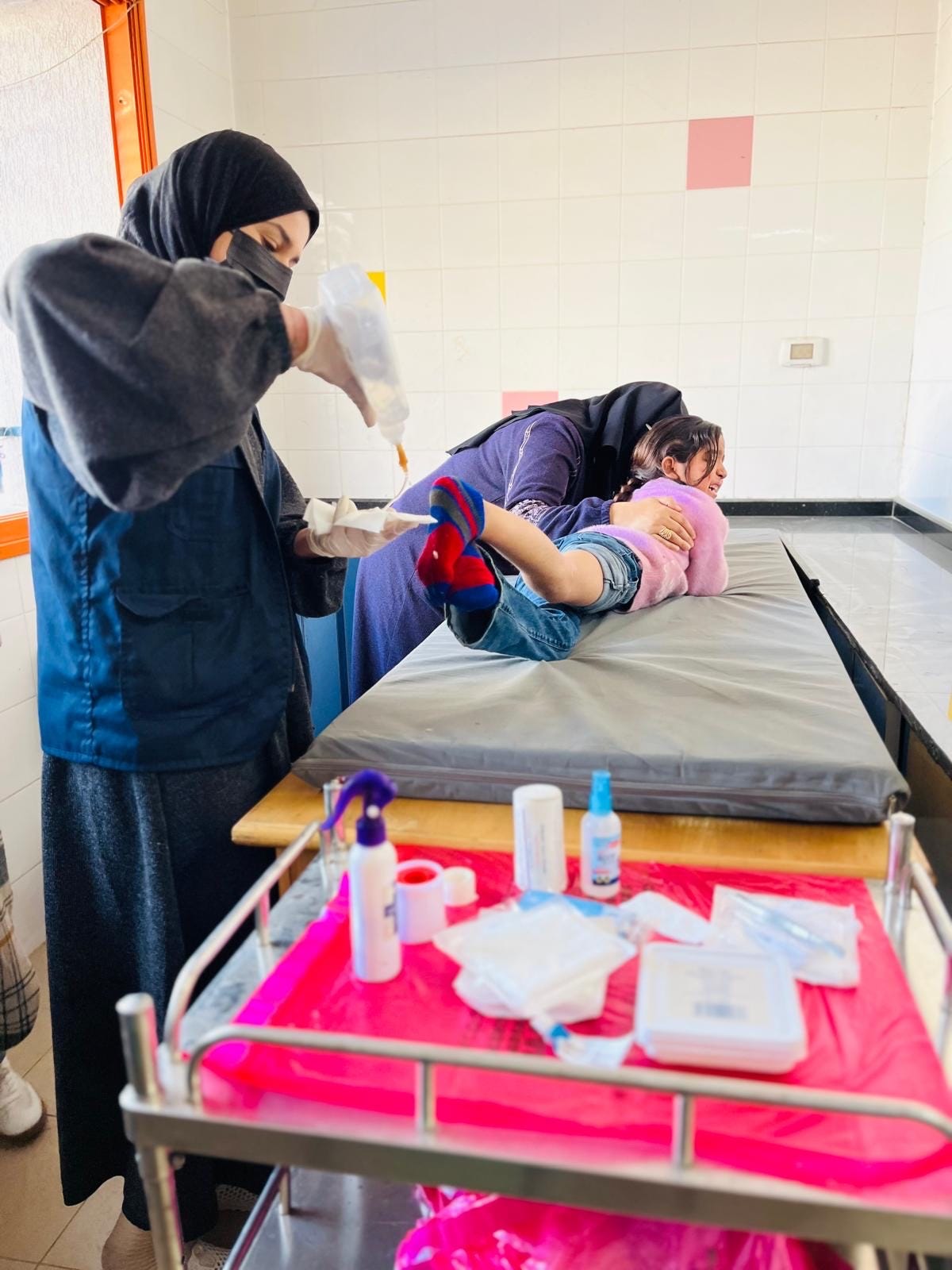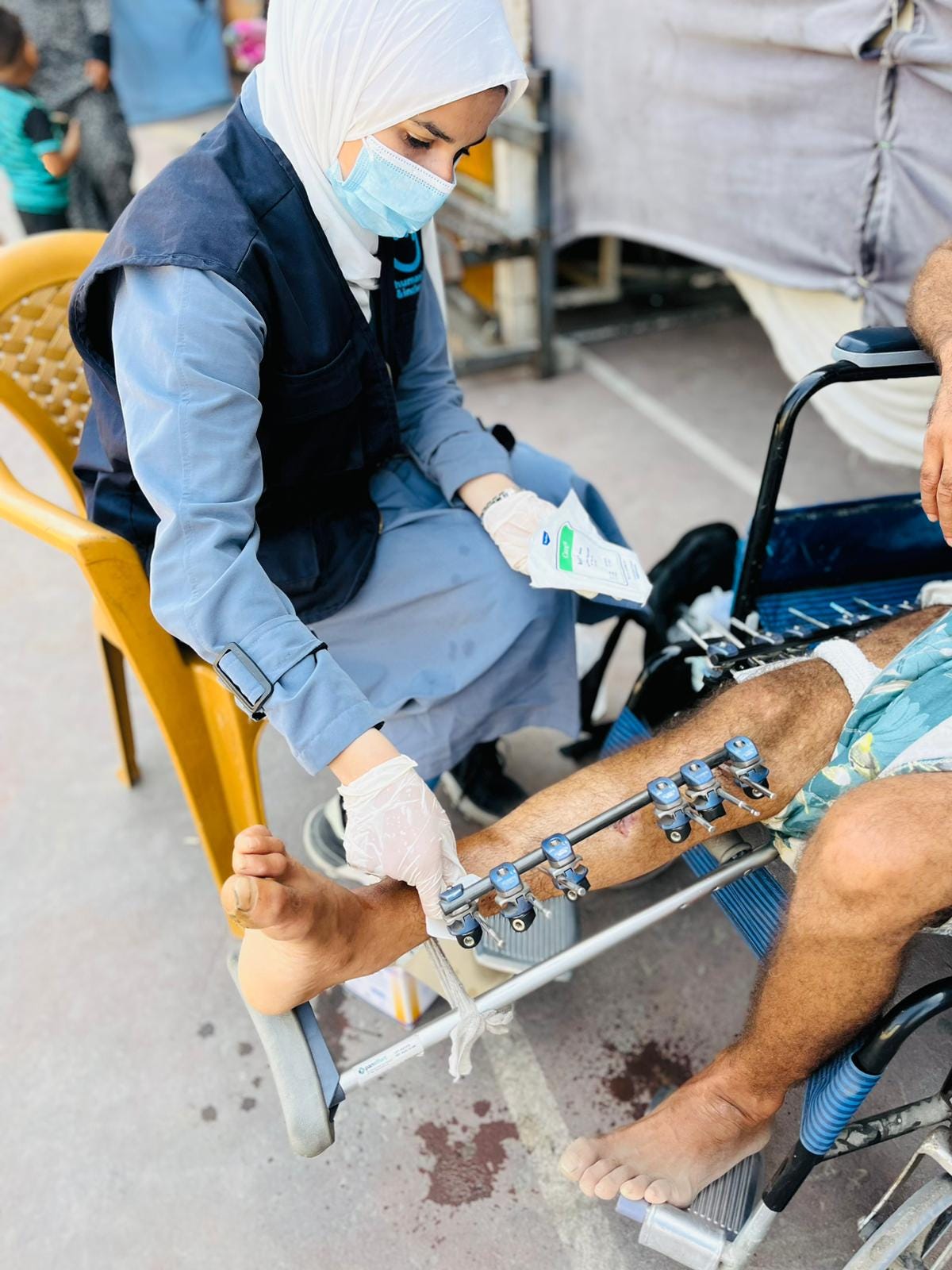A Nurse Witness to the Genocide in Gaza
"When I look at the faces I treat, I know every wound is a living testimony of the crimes being committed against us."
In Gaza, where the smell of gunpowder mixes with the moans of the wounded, hospitals are no longer just places for treatment—they have become emergency arenas exposed to tragedy. Amid one of the most severe humanitarian crises, Nurse Balsam stands as a symbol of human resilience. For months, she has not left the frontlines, remaining in field hospitals and camps, bearing witness to the mass killings her people are enduring.
Balsam is more than a nurse performing her duties; she has become an eye that documents, a hand that provides aid, and a heart that carries pain. She carries a small medical bag on her shoulder, but within her, she carries something far heavier: the images of children who fell lifeless, the cries of grieving mothers, and the sighs of helpless elders.
Her working hours have turned into a continuous journey between triage and emergency care, between hope and loss, balancing her professional duty with her humanitarian mission. In every emergency room and tented shelter, Balsam faces scenes that no camera can fully capture: children lying on the floor due to lack of beds, patients begging for pain relief, and lives fading away as power cuts leave ventilators useless.
Balsam's story is not just personal—it is a collective testimony of Gaza’s suffering. She stands against the machinery of war with bare hands, tearful eyes, and unwavering determination that grows stronger as the nights grow darker.
Between Hospitals and Camps
Every day, Balsam moves between the crowded corridors of field hospitals and the alleys of camps that have become makeshift clinics under tents. In hospitals, she confronts severe shortages of medical equipment and drugs, forcing medical teams to make life-or-death decisions with minimal resources. In the camps, the situation is harsher: mothers carrying wounded children, elders suffering in silence, and young amputees struggling to adapt to their new reality.
Balsam carries a small bag containing gauze, antiseptics, and a few injections—sometimes the only difference between life and death. She sighs as she recounts: "Sometimes I find myself facing a bleeding patient with only a piece of gauze. I press it on the wound and pray the bleeding stops. How many times have I wished for a mobile operating room or even a clean bed for a dying patient?"
Due to the lack of resources, only the most critical cases are treated, leaving others waiting for hours, sometimes days. Many minor surgical procedures are performed without full anesthesia due to the shortage of painkillers. Balsam recalls one painful moment: "I was beside a child with a broken leg, and we had only one dose of anesthesia reserved for a more critical patient. They had to set his leg while he screamed in pain. I have never forgotten his cries."
In hospitals, the cries of children and the sighs of mothers are a daily soundtrack. In camps, children follow her with hopeful eyes, seeing her as the last source of help. There, under tents, a clean bottle of water becomes medicine, and a mobile phone’s light becomes an operating lamp. Balsam describes: "I treat patients on the ground, sometimes on cardboard or old blankets. Here, there is no difference between a clinic and a dirt road—the goal is to save lives."
Despite the exhaustion, Balsam insists on moving between both locations. She knows her role is not only to treat wounds but also to witness what is happening. She says: "When I look at the faces I treat, I know every wound is a living testimony of the crimes being committed against us."
At Home and Motherhood Amid Fire
Away from the hospital and the chaos of emergencies, Balsam returns to her modest tent after her home was destroyed. There, she is met by her two-year-old daughter, who knows nothing of life beyond her mother’s embrace and a few handmade cloth toys. Balsam tries to shield her child from the bloodshed she witnesses daily, but the sound of explosions and the smell of smoke are stronger than any attempt to hide the truth.
Under the famine imposed by the siege, providing food and water for her daughter is a daily battle, no less challenging than treating the wounded. Balsam says: "Sometimes I return exhausted from the hospital, yet I have to stand in a long line just to get a loaf of bread or a bottle of milk for my daughter. It’s not easy to be a nurse for war victims and a mother to a hungry child at the same time."
Despite physical and psychological exhaustion, Balsam ensures her daughter experiences moments of tenderness amidst the chaos. She knows keeping her child safe and fed is her personal battle, just as saving lives at the hospital and in the camps is her professional one.
Stories from the Heart of Fire
Yassin (8 years old):
Yassin arrived at the emergency department after a wall collapsed in his home due to bombing. He was unconscious, his small body covered in blood. Balsam recalls: "I held him in my arms, tried to wake him multiple times, and when he opened his eyes with a faint smile, I felt hope was still alive. But he lost consciousness again, and we had only a small piece of gauze and a syringe to stabilize him."The Pregnant Mother:
One night, a pregnant woman arrived, injured by shrapnel in her home. She was in her eighth month. Balsam says: "We tried to save her with the limited tools we had. We managed to save the baby, but she passed away in our hands. That moment is unforgettable."The Traumatized Teen:
A 15-year-old boy was injured during an explosion while fleeing his home. He had injuries to his leg and arm, as well as severe psychological trauma. Balsam says: "It wasn’t just the physical pain that worried me, but the terrifying silence in his eyes, as if fear had settled there forever. I tried to calm him, but he kept trembling for hours."A Mother Unable to Lift Her Infant:
A newborn arrived with his mother after their home was hit. The mother was severely injured and unable to hold her child. Balsam says: "I held him in my hands, feeling the weight of responsibility more than ever. My only goal was to keep him alive until he received treatment."Lama (3 years old):
Lama arrived screaming in pain after being hit by shrapnel in her arm while fleeing with her family. Balsam says: "She was so small and didn’t understand what was happening. She cried incessantly. I tried to soothe her in every way, pressed the gauze on her wound until the bleeding stopped, and every moment I watched her heart beat as if it were the only hope left."Mohammed (20 years old – Amputated Leg):
A young man injured in an explosion near his home suffered severe damage to his leg. Due to the lack of proper medical resources and anesthesia, the medical team had to amputate his leg to save his life. Balsam recalls: "He screamed in pain and feared his future, but we tried to comfort him. His will to live was stronger than all the circumstances, and his smile after the operation was one of the most human moments I’ve ever witnessed."
Balsam, a Witness to the Tragedy
Amid every child’s scream and every mother’s tear, Balsam stands as a witness to Gaza’s immense tragedy. She not only treats wounds but also documents the suffering of her people, sharing the reality of war from the heart of the field. She says: "Every patient I save, every child I help—even for a moment—is a testimony to what is happening here. I cannot remain silent; silence would mean denying the suffering."
This daily testimony makes Balsam more than a nurse; she is the voice of Gaza’s humanity, a beacon of hope in darkness, carrying the stories of thousands whose voices have yet to be heard.
Conclusion
Balsam is not just a nurse, nor just a mother—she is a symbol of human resilience in Gaza. Amid the blood of the wounded and the cries of children, she continues her daily work despite fear, hunger, and exhaustion, carrying a clear message to the world: Gaza endures, and humanity can survive even under the harshest conditions. Her story is a living testimony to pain, patience, and courage, a reminder that behind every statistic is a living face, a heart still beating with hope despite everything.
You can donate to support Baslam and her work via Chuffed


